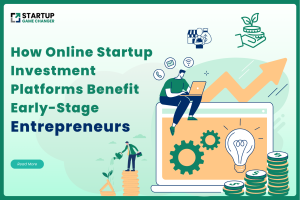In this blog post, we’ll discuss where to find angel investors and how to make the connection.
Recently, we hosted an exciting webinar session on where to find angel investors and how to make the connection. We were thrilled to have 56 start-up founders join us, sharing their start-up ideas, visions, and apprehensions regarding how to reach out to angel investors for funding.
The webinar session was buzzing with burning questions, useful advice, and insightful suggestions and discussions.
The Zoom session was hosted by Anshuman Sinha, an angel investor and co-founder of Startup Steroid, and Ashish Saboo, co-founder and CTO, of Startup Steroid.
Our esteemed guest speaker, Jerry Heikens, Startup Tech Advisor & Investor, was also present on the show, sharing his vital tips and insights on angel investment.
“The topic for today is Where to Find Angel Investors and How to Make the Connection. We want to make this an interactive community where we can help startup founders and resolve their doubts and queries,”—Anshuman Sinha.
We had Sumeet Gala – Sellia, a start-up founder from San Francisco, as the first speaker on the show. He shared his apprehension regarding investor’s reluctance to invest in start-ups as most investors want to wait and watch.
Our mentor acknowledged his thoughts, saying if the start-up’s valuation is high from the very start, it’s going to be difficult to get investors, but not impossible. Anshuman Sinha, who’s an angel investor himself also explained ‘buying time’ or saying ‘give us more time to think about it’ is the investor’s polite way of saying no. No investor would be going to directly say no but they give you enough hints that they are not interested in your start-up.

You can’t do anything about it because there can be multiple factors behind it.
Angel investment happens in stages, and a start-up has to qualify for all those stages before an angel investor would sign a check for it. Anshuman Sinha also emphasized the importance of networking in getting the necessary funds for start-ups.
Even if a few angel investors rejected your proposal or pitch deck, you should still keep trying elsewhere. As you may never know if another angel investor might say yes to your business proposal.
We also had Ravi Krishnamurthy on the webinar, he had a query that why he didn’t get any call even after submitting his pitch deck to an angel investment group.
At this, our mentor, Ashish Saboo, stated if you’ve not listened to anything yet, it means your pitch deck is still under the screening process. If it had been rejected you would get an email for it. So, you can wait for a few more days until the angel investors take a call on it.
Henry Khalife, Founder, GW Apps, Los Angeles, wanted to know how could he interact with angel investors or stay up to date about their activity since he is not much active on social media.
Both Anshuman and Jerry advised him to be at least active on LinkedIn. As it’s one of the best networking platforms to stay in touch with investors.
The rest of the discussion focused on how and what should start-up founders do to reach out to angel investors.
Breakdown of Where to Find Angel Investors and How to Make the Connection
Get in Touch with Angel Networks
As Ashish Saboo rightly pointed out that start-up founders should create a rapport with angel platforms, including AngelList, Angel Capital Association, and TieSocal Angels among others to connect with angels.
You can even use LinkedIn to start following these groups and stay abreast of their latest events and activity.
For your help, here are a few widely popular Angels associations that help connect startup founders with angel investors.
TieSocal Angels: TieSocal Angels represents 70 chapters across 12 countries. Tie refers to Talent, Ideas, and Enterprise. It mentors startup founders while helping them implement their business ideas. In addition, it also fosters entrepreneurship and empowers people to follow their passion and scale up their businesses. TieSocal Angels acts as a bridge that helps start-up founders reach out to various angel investors with their start-up proposal and business plan, besides making them aware of the start-up ecosystem and its essential aspects.
Angel Capital Association (ACA): It’s another professional development organization for angels and start-ups. It has over 15,000 registered and accredited angel investors. Startup founders can find this association extremely useful to get connected with investors and share their ideas with them for funding or mentorship.
Angel Investment Network: The network allows you to get access to over 300,00 angel investors who are registered on this network. It also allows you to showcase your pitch, which expedites the process of getting funded.
More or less, all these organizations work in the same manner. They work as a facilitator but don’t directly get involved in the process. However, through their wide network of angel investors, these associations can certainly assist you in finding interested angels.
Social Media: As a start-up founder, you can’t be complacent. You should be active on all social networking sites and search for interested investors who may be interested in investing in your start-up.
Twitter and LinkedIn can work best for startup founders as a lot of angel investors and VCs use these sites for networking purposes. You need to take the initiative and gently reach out to them without sounding too persuasive or dominating.
If you’re working on a great startup idea, you should speak about it and publicize your start-up all over social media. It makes your prospective investors properly understand your business, and get in touch with you, if interested.
Networking Events and Seminars: You shouldn’t miss out on visiting any networking events that are being held near you.

It can help you physically meet your potential investors and even directly interact with them face-to-face, or showcase your pitch deck within the time allotted to you for this purpose.
Make a Compelling Pitch: Even if you get a chance to meet angel investors or interact with them, it won’t help unless your pitch deck is professional and interesting.
While creating a pitch deck, you have to primarily focus on: what your startup does, paint points of customers, and how can your products or services help them.
In addition, you should also include other necessary information relating to your business, team, financials, and vision.
Keep it short and concise, but descriptive enough to let investors know what are your future plans and how’ll you utilize the funds if you find an investor.
Wrapping Up
It’s not too easy to make a connection with angel investors. But if you focus on the right direction, you’ll certainly succeed. Another important thing that our mentors and even other attendees pointed out is that ‘don’t pay anything to anyone’ just to get your pitch deck reviewed. If someone even asks for it, just stay away.







